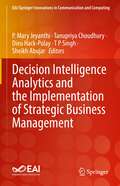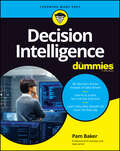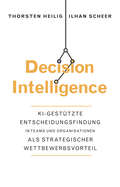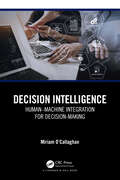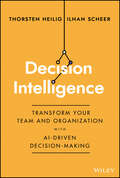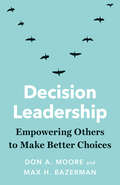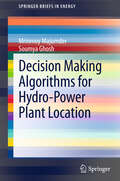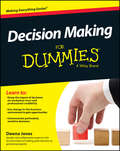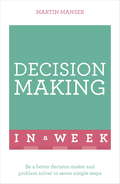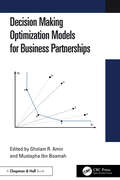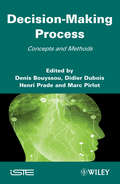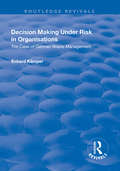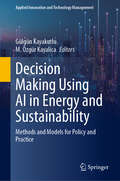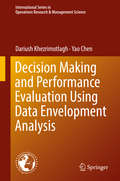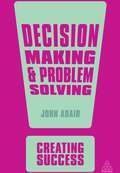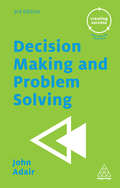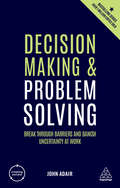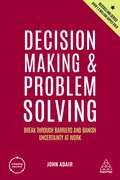- Table View
- List View
Decision Economics: Minds, Machines, and their Society (Studies in Computational Intelligence #990)
by Shu-Heng Chen Edgardo Bucciarelli Juan M. Corchado Javier Parra D.This book is the result of a multi-year research project led and sponsored by the University of Chieti-Pescara, National Chengchi University, University of Salamanca, and Osaka University. It is the fifth volume to emerge from that international project, held under the aegis of the United Nations Academic Impact in 2020. All the essays in this volume were (virtually) discussed at the University of L’Aquila―as the venue of the 2nd International Conference on Decision Economics, a three-day global gathering of approximately one hundred scholars and practitioners—and were subjected to thorough peer review by leading experts in the field. The essays reflect the extent, diversity, and richness of several research areas, both normative and descriptive, and are an invaluable resource for graduate-level and PhD students, academics, researchers, policymakers and other professionals, especially in the social and cognitive sciences. Given its interdisciplinary scope, the book subsequently delivers new approaches on how to contribute to the future of economics, providing alternative explanations for various socio-economic issues such as computable humanities; cognitive, behavioural, and experimental perspectives in economics; data analysis and machine learning as well as research areas at the intersection of computer science, artificial intelligence, mathematics, and statistics; agent-based modelling and the related. The editors are grateful to the scientific committee for its continuous support throughout the research project as well as to the many participants for their insightful comments and always probing questions. In any case, the collaboration involved in the project extends far beyond the group of authors published in this volume and is reflected in the quality of the essays published over the years.
Decision Intelligence Analytics and the Implementation of Strategic Business Management (EAI/Springer Innovations in Communication and Computing)
by Dieu Hack-Polay Tanupriya Choudhury P. Mary Jeyanthi T P Singh Sheikh AbujarThis book presents a framework for developing an analytics strategy that includes a range of activities, from problem definition and data collection to data warehousing, analysis, and decision making. The authors examine best practices in team analytics strategies such as player evaluation, game strategy, and training and performance. They also explore the way in which organizations can use analytics to drive additional revenue and operate more efficiently. The authors provide keys to building and organizing a decision intelligence analytics that delivers insights into all parts of an organization. The book examines the criteria and tools for evaluating and selecting decision intelligence analytics technologies and the applicability of strategies for fostering a culture that prioritizes data-driven decision making. Each chapter is carefully segmented to enable the reader to gain knowledge in business intelligence, decision making and artificial intelligence in a strategic management context.
Decision Intelligence For Dummies
by Pamela BakerLearn to use, and not be used by, data to make more insightful decisions The availability of data and various forms of AI unlock countless possibilities for business decision makers. But what do you do when you feel pressured to cede your position in the decision-making process altogether? Decision Intelligence For Dummies pumps the brakes on the growing trend to take human beings out of the decision loop and walks you through the best way to make data-informed but human-driven decisions. The book shows you how to achieve maximum flexibility by using every available resource, and not just raw data, to make the most insightful decisions possible. In this timely book, you’ll learn to: Make data a means to an end, rather than an end in itself, by expanding your decision-making inquiries Find a new path to solid decisions that includes, but isn’t dominated, by quantitative data Measure the results of your new framework to prove its effectiveness and efficiency and expand it to a whole team or company Perfect for business leaders in technology and finance, Decision Intelligence For Dummies is ideal for anyone who recognizes that data is not the only powerful tool in your decision-making toolbox. This book shows you how to be guided, and not ruled, by the data.
Decision Intelligence dt.
by Thorsten Heilig Ilhan ScheerDas Buch von Thorsten Heilig und Ilhan Scheer richtet sich an alle Führungskräfte, Entscheidungsträger und Menschen, die Daten und KI-basierte Ansätze in ihre Entscheidungsprozesse einbeziehen wollen. Es ist sowohl auf den Technologiesektor als auch auf traditionellere Branchen anwendbar und untersucht, wie datengesteuerte und KI-basierte Entscheidungsfindung Branchen, Organisationen und Einzelpersonen grundlegend verändert. Es ist eine leicht verdauliche Lektüre für Menschen in jeder Phase der Entscheidungsfindung und schlüsselt neue Technologien, Ansätze und Algorithmen auf, um die Lücke zwischen Verhaltenswissenschaft, Data Science und technologischer Innovation zu schließen. Die Autoren behandeln die wichtigsten Themen auf diesem Gebiet, unter anderem: - Einführung in die Entscheidungsintelligenz: warum traditionelle Ansätze zur Entscheidungsfindung geändert werden müssen und warum dies jetzt geschehen muss; - Vergleich zwischen komplexen und dynamischen Umgebungen und Entwicklung von linearen Analysen zu Process Mining und RPA (voll-automatisierte Prozesse) hin zu smarten, dynamischen Entscheidungsfindungen; - drei Stufen der Entscheidungsintelligenz: unterstützen, erweitern, automatisieren (Support, Augment, Automate); - Entscheidungsintelligenz in Organisationen, einschließlich: agile Transformation, transparente Organisationskultur und neue Wege der Entscheidungsfindung auf Unternehmensebene; - Entscheidungsintelligenz in Teams und bei Einzelpersonen: grundlegende psychologische Veränderungen, Führung und psychologische Sicherheit als Anker für eine gelungene Transformation hin zu einem stark daten-orientierten Team und Unternehmen.
Decision Intelligence: Human–Machine Integration for Decision-Making
by Miriam O'CallaghanRevealing the limitations of human decision-making, this book explores how Artificial Intelligence (AI) can be used to optimize decisions for improved business outcomes and efficiency, as well as looking ahead to the significant contributions Decision Intelligence (DI) can make to society and the ethical challenges it may raise. From the theories and concepts used to design autonomous intelligent agents to the technologies that power DI systems and the ways in which companies use decision-making building blocks to build DI solutions that enable businesses to democratize AI, this book presents an impressive framework to integrate artificial and human intelligence for the success of different types of business decisions. Replete with case studies on DI applications, as well as wider discussions on the social implications of the technology, Decision Intelligence: Human–Machine Integration for Decision Making appeals to both students of AI and data sciences and businesses considering DI adoption.
Decision Intelligence: Transform Your Team and Organization with AI-Driven Decision-Making
by Thorsten Heilig Ilhan ScheerDramatically improve your decisions with data and AI In Decision Intelligence: Transform Your Team and Organization with AI-Driven Decision-Making, a team of pioneering decision and AI strategists delivers a digestible and hands-on resource for professionals at every part of the decision-making journey. The book discusses the latest technology and approaches that bridge the gap between behavioral science, data science, and technological innovation. Discover how leaders from various industries and environments are using data and AI to make better future decisions, taking both human as well as business factors into account. This book covers: A demystifying behind-the-scenes peek inside how AI models, forecasts, and optimization for business challenges really work, and why they open up entirely new possibilities. A business-ready introduction to decision intelligence, exploring why traditional decision-making strategies are outdated and how to transition to decision-intelligence. The evolution of Decision Intelligence, coming from analytics and modern techniques like process mining and robotic process automation An examination of decision intelligence at the organizational level, including discussions of agile transformation, transparent organizational culture, and why psychological safety is a crucial enabler for new ways of decision-making in modern companies An overview of why (and where exactly) AI still needs human expertise and how to incorporate this topic in daily planning and decision making Decision Intelligence is essential reading for managers, executives, board members, other business leaders and soon-to-be leaders looking to improve the quality, adaptability, and speed of their decision-making.Praise for Decision Intelligence "In Decision Intelligence, Thorsten Heilig and Ilhan Scheer build a compelling case for the world of tomorrow’s version of decision-making.”―Martin Lindstrom, New York Times best-selling author"Decision Intelligence will be one of the big topics for this decade and completely change the way organizations manage, plan, and operate. This book provides a comprehensive guide from the basics to the applications."―Niklas Jansen, Entrepreneur and Tech Investor, Founding Partner Interface Capital and Co-Founder Blinkist "The book impressively demonstrates the potential and entry points into the world of AI-powered decision making. A very valuable reading for managers and their organizations".―Michael Kleinemeier, Member of the Merck KG Board of Partners, former Member of the SAP SE Executive Board“The AI hype perfectly captured, easy to understand, de-mystified and mapped to clear use cases - a must-read for today's managers.”―Dr. Daniela Gerd tom Markotten, Member of the Management Board for Digitalization and Technology, Deutsche Bahn AG
Decision Leadership: Empowering Others to Make Better Choices
by Max H. Bazerman Don A. MooreA fresh, research-driven playbook for how successful leaders can maximize the potential of others When we think of leaders, we often imagine lone, inspirational figures lauded for their behaviors, attributes, and personal decisions, and leadership books often reinforce that view. However, this approach ignores a leader&’s mission to empower others. Applying decades of behavioral science research, Don A. Moore and Max H. Bazerman offer a passionate corrective to this view, casting today&’s organizations as decision factories in which effective leaders are decision architects, enabling those around them to make wise, ethical choices consistent with their own interests and the organization&’s highest values. As a result, a leader&’s impact grows because it ripples out instead of relying on one individual to play the part of heroic figure. Filled with real-life stories and examples of the structures, incentives, and systems that successful leaders have used, this playbook equips each of us to facilitate wise decisions.
Decision Making Algorithms for Hydro-Power Plant Location
by Mrinmoy Majumder Soumya GhoshThe present study has attempted to apply the advantage of neuro-genetic algorithms for optimal decision making in maximum utilization of natural resources. Hydro-power is one of the inexpensive, but a reliable source of alternative energy which is foreseen as the possible answer to the present crisis in the energy sector. However, the major problem related to hydro-energy is its dependency on location. An ideal location can produce maximum energy with minimum loss. Besides, such power-plant also requires substantial amount of land which is a precious resource nowadays due to the rapid and uncontrolled urbanization observed in most of the urban centres in the World. The feasibility of such plants also depends on social acceptance as well as the level of environmental casualty and economic benefit, all of which is also spatially dependent. Decision making algorithms are applied to identify better solution if a problem has more than one alternative explication. Nature based algorithms are found to be efficient enough to catalyze such kind of decision making analysis. That is why the present study tries to utilize nature based algorithms to solve the problems of location selection for hydropower plants. The study employed six different types of nature based algorithms to select one of the locations among many available for installation of hydropower plant in the North Eastern part of the Indian subcontinent. The locations are selected based on their in stream resources and included in the decision making as alternatives. A methodology of criteria selection, determination of weightage and applications of bioinspired algorithms are adopted to produce utmost exertion of the available natural resources with minimum hostility and wastage of the same.
Decision Making For Dummies
by Dawna JonesDiscover the best approaches for making business decisions Today's business leaders have to face the facts-you can't separate leadership from decision making. The importance of making decisions, no matter how big or small, cannot be overstated. Decision Making For Dummies is a candid resource that helps leaders understand the impact of their choices, not only on business, but also on their credibility and reputation. Designed for managers, business owners, and anyone else who makes tough decisions on a daily basis, this guide helps you figure out if the decisions you're making are the right ones. In addition to helping you explore how to evaluate your choices, Decision Making For Dummies covers ways to receive support for decision making, delves into various decision-making styles, reviews the importance of sifting through data and information, and includes information on ways to engage others and make decisions collectively. Being in charge can be challenging, but with this guide, you don't have to go it alone. Discusses the effects of decision making and outlines the considerations that must be made to gain trust and confidence Demonstrates ways to communicate particularly sensitive decisions, and offers approaches for making bold decisions that challenge the status quo Delves into the risks and benefits of certain decisions, and shows readers the best ways to evaluate choices Outlines smart strategies for engaging others and drawing them into the decision-making process Crucial decisions need to be made every day in the business world, so there's no time to waste. Make Decision Making For Dummies your primary resource for learning to choose your actions wisely and confidently.
Decision Making In A Week: Be A Better Decision Maker And Problem Solver In Seven Simple Steps
by Martin ManserThe ability to make the right decision is crucial to anyone who wants to advance their career.Written by Martin Manser, a leading expert on decision making in a business context, this book quickly teaches you the insider secrets you need to know to in order to choose the right path.The highly motivational 'in a week' structure of the book provides seven straightforward chapters explaining the key points, and at the end there are optional questions to ensure you have taken it all in. There are also cartoons and diagrams throughout, to help make this book a more enjoyable and effective learning experience.So what are you waiting for? Let this book put you on the fast track to success!
Decision Making In A Week: Be A Better Decision Maker And Problem Solver In Seven Simple Steps
by Martin ManserThe ability to make the right decision is crucial to anyone who wants to advance their career.Written by Martin Manser, a leading expert on decision making in a business context, this book quickly teaches you the insider secrets you need to know to in order to choose the right path.The highly motivational 'in a week' structure of the book provides seven straightforward chapters explaining the key points, and at the end there are optional questions to ensure you have taken it all in. There are also cartoons and diagrams throughout, to help make this book a more enjoyable and effective learning experience.So what are you waiting for? Let this book put you on the fast track to success!
Decision Making Optimization Models for Business Partnerships
by Gholam R. Amin Mustapha Ibn BoamahEfficiency and productivity improvement are imperative for businesses to remain competitive in an increasingly dynamic marketplace. While business organizations have the potential to thrive independently, collaborating with others fosters a collective strength that can lead to greater innovation, expanded reach, and shared success.Decision making optimization models for business partnerships are essential, as businesses seldom have all the resources they need, and thus, they require alliances and partnerships with others to enable them to meet their goals. Decision Making Optimization Models for Business Partnerships extends non-parametric data envelopment analysis (DEA) and parametric econometrics approaches to better understand how economic efficiency and market competitiveness are achieved for different types of partnerships and strategic alliances.Features Global contributions for a wide range of professionals and academics Invaluable resources for businesses, analysts, and academics interested in DEA, optimization, and operations research more widely Introduces readers to novel approaches, models, and decision making techniques on performance evaluation and business partnerships via the medium of parametric and nonparametric optimization.
Decision Making Process: Concepts and Methods
by Didier Dubois Denis Bouyssou Marc Pirlot Henri PradeThis book provides an overview of the main methods and results in the formal study of the human decision-making process, as defined in a relatively wide sense. A key aim of the approach contained here is to try to break down barriers between various disciplines encompassed by this field, including psychology, economics and computer science. All these approaches have contributed to progress in this very important and much-studied topic in the past, but none have proved sufficient so far to define a complete understanding of the highly complex processes and outcomes. This book provides the reader with state-of-the-art coverage of the field, essentially forming a roadmap to the field of decision analysis. The first part of the book is devoted to basic concepts and techniques for representing and solving decision problems, ranging from operational research to artificial intelligence. Later chapters provide an extensive overview of the decision-making process under conditions of risk and uncertainty. Finally, there are chapters covering various approaches to multi-criteria decision-making. Each chapter is written by experts in the topic concerned, and contains an extensive bibliography for further reading and reference.
Decision Making Theories and Methods Based on Interval-Valued Intuitionistic Fuzzy Sets
by Shuping Wan Jiuying DongThis is the first book to provide a comprehensive and systematic introduction to the ranking methods for interval-valued intuitionistic fuzzy sets, multi-criteria decision-making methods with interval-valued intuitionistic fuzzy sets, and group decision-making methods with interval-valued intuitionistic fuzzy preference relations. Including numerous application examples and illustrations with tables and figures and presenting the authors’ latest research developments, it is a valuable resource for researchers and professionals in the fields of fuzzy mathematics, operations research, information science, management science and decision analysis.
Decision Making Under Risk in Organisations: The Case of German Waste Management (Routledge Revivals)
by Eckard KamperThis title was first published in 2000. By comparing how two local authorities deal with the risks involved in Germany's environmental waste policy, this text questions how organizations deal with making decisions in situations of risk in general. Using a combination of risk sociology and institutional theories of organization, Kamper examines how organizations develop institutional structures to cope with risk-taking decision-making. In doing so, he challenges the commonly-held view that the most important factor required when making risky decisions is rationality, and instead argues that the key is an ability to absorb uncertainty. The volume seeks to show how organizations develop institutional structures to cope with risk-taking which both absorbs uncertainty and allocates responsibility, and how an understanding of social structures is crucial to understanding how such decisions are made by organizations.
Decision Making Using AI in Energy and Sustainability: Methods and Models for Policy and Practice (Applied Innovation and Technology Management)
by Gülgün Kayakutlu M. Özgür KayalicaArtificial intelligence (AI) has a huge impact on science and technology, including energy, where access to resources has been a source of geopolitical conflicts. AI can predict the demand and supply of renewable energy, optimize efficiency in energy systems, and improve the management of natural energy resources, among other things. This book explores the use of AI tools for improving the management of energy systems and providing sustainability with smart cities, smart facilities, smart buildings, smart transportation, and smart houses. Featuring research from International Federation for Information Processing's (IFIP) “AI in Energy and Sustainability” working group, this book provides new models and algorithms for AI applications in energy and sustainability fields. Any short-term, mid-term and long-term forecasting, optimization models, trend foresights and prescriptions based on scenarios are studied in the energy world and the smart systems for sustainability. The contents of this book are valuable for energy researchers, academics, scholars, practitioners and policy makers.
Decision Making and Performance Evaluation Using Data Envelopment Analysis: Theory, Modeling And Applications (International Series in Operations Research & Management Science #269)
by Yao Chen Dariush KhezrimotlaghThis book offers new transparent views and step-by-step methods for performance evaluation of a set of units using Data Envelopment Analysis (DEA). The book has twelve practical chapters. Elementary concepts and definitions are gradually built in Chapters 1-6 based upon four examples of one input and one output factors, two input factors, two output factors, and four input and three output factors. Simultaneously, the mathematical foundations using linear programming are also introduced without any prerequisites. A reader with basic knowledge of mathematics and computers is able to understand the contents of the book. In addition, to prevent pre-judgment about the available concepts and definitions in the DEA literature, some new phrases are introduced and, after elucidating each phrase in detail in Chapters 1-6, they are reintroduced for industry-wide accuracy in Chapter 7. After that, some of the more advanced DEA topics are illustrated in Chapters 8-12, such as: production-planning problems, output-input ratio analysis, efficiency over different time periods, Malmquist efficiency indexes, and a delta neighborhood model.A clear overview of many of the elementary and advanced concepts of DEA is provided, including Technical Efficiency, Relative Efficiency, Cost/Revenue/Profit Efficiency, Price/Overall Efficiency, the DEA axioms, the mathematical background to measure technical efficiency and overall efficiency, the multiplier/envelopment form of basic DEA models in input/output-orientation, the multiplier/envelopment of Additive DEA model, the multiplier/envelopment of slacks-based models, and others. The book also covers a variety of DEA techniques, input-output ratio analysis, the natural relationships between DEA frontier and the ratio of output to input factors, production-planning problems, planning ideas with a centralized decision-making unit, context-dependent DEA, Malmquist efficiency index, efficiency over different time periods, and others. End-of-chapter exercises are provided for each chapter.
Decision Making and Problem Solving
by John AdairEnsuring innovation and a creative approach to new challenges is crucial in leadership success. Being able to communicate and share your ideas takes no less skill. Decision Making and Problem Solving Strategies will help you to learn key techniques and models to confidently make the right decisions. Using checklists, exercises and case studies, Adair provides a clear framework to find solutions, generate ideas and inspire confidence in your team - so you can spot the solution in every problem, and create ideas to rival even the best strategists.
Decision Making and Problem Solving
by John AdairIn Decision Making and Problem Solving, leadership guru John Adair provides the techniques and insights you need to find solutions, spark creativity and confidently make the right decisions.Being able to take innovative and creative approaches to new challenges is crucial for leadership success. Decision Making and Problem Solving will help you to learn key techniques and models to confidently make the best decisions and solve the hardest problems. Using checklists, exercises, case studies and tried-and-tested methods, Adair provides a clear framework that can generate ideas and inspire confidence in your team - so you can spot the solution in every problem, and create ideas to rival even the best strategists.The creating success series of books...With over one million copies sold, the hugely popular Creating Success series covers a wide variety of topics and is written by an expert team of internationally best-selling authors and business experts. This indispensable business skills collection is packed with new features, practical content and inspiring guidance for readers across all stages of their careers.
Decision Making and Problem Solving: Break Through Barriers and Banish Uncertainty at Work (Creating Success #66)
by John AdairIn Decision Making and Problem Solving, leadership guru John Adair provides the techniques and insights you need to find solutions, spark creativity and confidently make the right decisions. Fully updated for 2019, this 4th edition now features even more practical exercises, useful templates, and top tips to provide a clear framework that can generate ideas and inspire confidence in your team - so you can spot the solution in every problem, and create ideas to rival even the best strategists.The Creating Success series of books...Unlock vital skills, power up your performance and get ahead with the bestselling Creating Success series. Written by experts for new and aspiring managers and leaders, this million-selling collection of accessible and empowering guides will get you up to speed in no time. Packed with clever thinking, smart advice and the kind of winning techniques that really get results, you'll make fast progress, quickly reach your goals and create lasting success in your career.
Decision Making and Problem Solving: Break Through Barriers and Banish Uncertainty at Work (Creating Success #8)
by John AdairThought leader John Adair provides the techniques and insights you need to find solutions, spark creativity and confidently make the right decisions. This 5th edition now features even more practical exercises, useful templates, and top tips to provide a clear framework that can generate ideas and inspire confidence in your team - so you can spot the solution in every problem, and create ideas to rival even the best strategists.The Creating Success series of books...Unlock vital skills, power up your performance and get ahead with the bestselling Creating Success series. Written by experts for new and aspiring managers and leaders, this million-selling collection of accessible and empowering guides will get you up to speed in no time. Packed with clever thinking, smart advice and the kind of winning techniques that really get results, you'll make fast progress, quickly reach your goals and create lasting success in your career.
Decision Making as Leadership Foundation
by Michael UseemAll organizations have an interest in ensuring that their leaders make good and timely decisions, but good decision making-so vital to effective leadership-is not a skill that comes naturally to every leader. Studies of what Nobel laureate and noted expert on decision making Daniel Kahneman terms "systemic biases"-the mental flaws that separate the choices leaders actually make from what rational agent models expect-reveal that these biases can be reduced when leaders are trained in decision making and have learned from experience. Both universities and companies bear the responsibility of preparing current and future leaders to make sound decisions in work environments that are often demanding and frequently changing. And given the impact of increasingly global product and equity markets on company operations, the pressures for quality decision making are sure to intensify. The chapter concludes with an examination of how boards of directors make decisions, with rich examples from Boeing (its decision to build the 787 aircraft) and computer technology giant Lenovo (its decision to build a global company). This chapter was originally published as Chapter 18 of "Handbook of Leadership Theory and Practice: A Harvard Business School Centennial Colloquium."
Decision Making as a Learning Activity
by Arie De GeusEvery act of decision making is a learning process. This chapter describes the elements of learning and how understanding the learning process can benefit your company.
Decision Making at the Top: The All-Star Sports Catalog Division
by David A. Garvin Michael A. RobertoDescribes a senior management team's strategic decision-making process. The division president faces three options for redesigning the process to address several key concerns. The president has extensive quantitative and qualitative data about the process to guide him as he and the senior team attempt to make improvements.
Decision Making for Enhanced Health Security: Managing Emerging Health Threats, Making Reasoned Choices, and Allocating Scarce Resources (International Series in Operations Research & Management Science #328)
by Gilberto MontibellerHealth threats pose significant dangers to humankind and form a major source of human suffering and sorrow. Responsible leadership and reasoned decision making can significantly improve the arenas that are affected by health threats, through establishing a better allocation of very scarce resources for building health capabilities and for increasing health preparedness, responsiveness and resilience.This book examines how public health leaders can use the cutting-edge research from Decision Sciences to better manage emerging and re-emerging health threats, with a focus on enhancing health security. While these decisions must be informed by the best available evidence, they must also address competing priorities and key uncertainties and must mitigate critical risks, albeit in a cost-effective manner which seeks to maximize societal value.This is a book about how decisions on health security can be improved, both in terms of the content that is utilized in a health decision analysis and the decision processes that are employed in reaching a decision. This decision-focused perspective can help public health leaders and public health experts to increase the health preparedness of health systems, the task of which involves improving health capabilities, increasing the robustness of health systems against health threats, as well as strengthening health resilience and the responsiveness of these systems against disease outbreaks.

